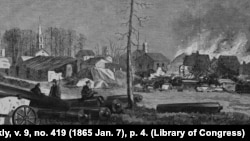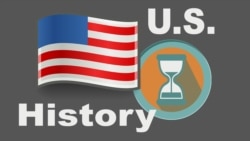From VOA Learning English, this is The Making of a Nation. I’m Kelly Jean Kelly.
And I’m Jonathan Evans.
By the autumn of 1864, it appeared the North would defeat the South in the American Civil War. The southern army needed men and supplies. There was little hope of getting enough of either to win.
The northern army was stronger and better-equipped. But it, too, had suffered. Hundreds of thousands of soldiers on both sides had been killed or wounded in more than three years of fighting.
Still, the war continued. In the East, Union armies slowly pushed toward their main target -- the Confederate capital at Richmond, Virginia. In the West, Union armies slowly pushed deeper into Confederate territory.
General William Sherman led the western armies.
Sherman had two goals. One was to capture Atlanta, Georgia. Atlanta was one of the few remaining industrial cities of the Confederacy. The other goal was to destroy the Confederate army led by General Joseph Johnston.
Sherman's army was stronger than Johnston's army. But Confederate forces usually had better defensive positions. Sherman refused to attack in such situations. Again and again, he simply ordered Union soldiers to march around the Confederates and forced them to withdraw.
Confederate President Jefferson Davis began to believe that General Johnston was afraid to fight. He replaced Johnston with another general.
Within two days, that general attacked the Union Army. The attack began without enough planning. It was based on false information. It was a disaster.
In 11 days of fighting, one-third of the Confederate Army in Georgia was destroyed. The remaining force was too weak to defend Atlanta. The city fell.
After capturing Atlanta, General Sherman decided to march to Savannah, Georgia, a city on the Atlantic coast.
Before leaving, his men set fire to Atlanta. Almost the entire city was destroyed.
Sherman's army continued to burn towns all the way to Savannah, 350 kilometers away. The army cut a path of destruction more than 100 kilometers wide.
This campaign became known as Sherman's March to the Sea.
Sherman did not depend on Union supply lines to feed his troops. Instead, Union soldiers stopped at farms and villages. They took food and clothing. They took horses, cows and other animals.
They set fire to houses and burned crops. They destroyed stores and factories. They burned bridges and pulled up railroad tracks.
The army faced little opposition. Small groups of Confederate horse soldiers struck at the edges of the army. But they did not do much damage.
On December 22, 1864, Sherman reached Savannah. He sent a message to President Abraham Lincoln in Washington, DC. Sherman said: "I beg to present you, as a Christmas holiday gift, the city of Savannah."
Sherman's campaign cut a great wound in the heart of the Confederacy. All that remained were the states of South Carolina, North Carolina and Virginia.
His March to the Sea was a strategic victory because it severely reduced the South’s economic and transportation abilities. But -- just as important -- it damaged the spirit of the South.
I’m Jonathan Evans.
And I’m Kelly Jean Kelly.
This is The Making of a Nation from VOA Learning English.
Frank Beardsley, Christine Johnson and Kelly Jean Kelly wrote this story. George Grow was the editor.
______________________________________________________________
Words in This Story
defensive – adj. defending or protecting someone or something from attack
disaster – n. something that has a very bad effect or result
supply lines – n. routes used to deliver food and equipment to soldiers during a war
present – v. to give something to someone in a formal way







